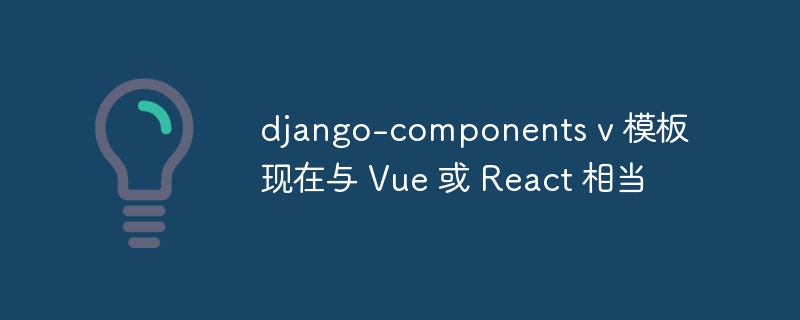django-components v 模板现在与 Vue 或 React 相当(模板.components.django.Vue.React...)

嘿,我是 juro,我是 django-components 的维护者之一。在 v0.90-0.94 版本中,我们添加了一些功能,使在模板中使用组件更加灵活,类似于 jsx / vue。
(此信息已经有点过时了(一个月前发布;最新的是 v0.101),因为我正忙于添加对 js / css 变量、typescript 和 sass 以及 html 片段的支持。令人兴奋的东西!但我意识到还没有分享此更新!)
无论如何,以下是一个 blog_post 组件,它接受从 blog_post_props 应用的标题、id 和附加 kwargs:
{% blog_post
title="{{ person.first_name }} {{ person.last_name }}"
id="{% random_int 10 20 %}"
...blog_post_props
/ %}
以上是多个特征的组合:
1。自关闭标签:
而不是
{% component "my_component" %}
{% endcomponent %}
您现在可以简单地写
{% component "my_component" / %}
2。多行标签:
django_components 现在自动配置 django 以允许多行标签。因此,不要将所有内容都塞在一行中:
{% component "blog_post" title="abcdef..." author="john wick" date_published="2024-08-28" %}
{% endcomponent %}
您可以将其分散到多行中:
{% component "blog_post"
title="abcdef..."
author="john wick"
date_published="2024-08-28"
/ %}
3。展开运算符:
类似于 jsx 中的 ...props 运算符或 vue 中的 v-bind,这会将 props / kwargs 插入给定位置。
所以而不是
{% component "blog_post"
title="abcdef..."
author="john wick"
date_published="2024-08-28"
/ %}
你可以将 kwargs 放入字典中,然后应用它:
# python
props = {
"title": "abcdef...",
"author": "john wick",
"date_published": "2024-08-28"
}
{# django #}
{% component "blog_post" ...props %}
4。组件输入中字符串文字内的模板标签:
您现在可以在组件输入中使用模板标签和过滤器:
{% component 'blog_post'
"as positional arg {# yay #}"
title="{{ person.first_name }} {{ person.last_name }}"
id="{% random_int 10 20 %}"
readonly="{{ editable|not }}"
/ %}
这样您就不必每次需要格式化值时都定义额外的变量。
请注意,当只有一个标签并且周围没有额外的文本时,结果将作为值传递。所以“{% random_int 10 20 %}”传递一个数字,“{{ editable|not }}”传递一个布尔值。
您甚至可以更进一步,获得与 vue 或 react 类似的体验,您可以在其中评估任意代码表达式,又名类似于:
<myform value="{" isenabled inputvalue : null></myform>
这可以通过 django-expr 实现,它添加了一个 expr 标签和过滤器,您可以使用它来计算模板中的 python 表达式:
{% component "my_form"
value="{% expr 'input_value if is_enabled else none' %}"
/ %}
5。支持 {% comp_name %} {% endcomp_name %} 和 tagformatter
默认情况下,组件是使用组件标签编写的,后跟组件的名称:
{% component "button" href="..." disabled %}
click me!
{% endcomponent %}
您现在可以更改此设置(甚至可以自己制作!)。
例如,将 components.tag_formatter 设置为“django_components.shorthand_component_formatter”允许您编写如下组件:
{% button href="..." disabled %}
Click me!
{% endbutton %}
还有更多功能即将推出,所以一定要尝试一下 django-components!
以上就是django-components v 模板现在与 Vue 或 React 相当的详细内容,更多请关注知识资源分享宝库其它相关文章!
